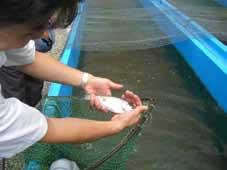The April 2010 distiller’s dried grains with solubles (DDGS) fish feeding trial in Japan recently concluded with favorable results both in lower input costs and equal or greater quality fish meat. The U.S. Grains Council conducted the trial at a rainbow trout commercial aquaculture farm in the Aichi Prefecture in response to the rising cost of fish meal, a high demand ingredient throughout Asia with limited supply.
Mr. Akio Yonehana of the Aichi Trout Farmers Cooperative Association, location of the trial, recently presented the results at a DDGS seminar conducted in Tokyo and Sizuoka. The trial showed that trout farmers can lower feed cost per weight gain by at least 10 percent by replacing 15 percent of the fishmeal inclusion with the high protein U.S. DDGS. There was also no yellow-coloring in the muscles of the trout, showing whiter fish meat in the DDGS fed group.
“Conventional compound feed for rainbow trout in Japan includes fishmeal with an inclusion rate greater than 50 percent. The increased feed cost caused by expensive fishmeal cannot be passed onto consumers,� said Hiroko Sakashita, USGC associate director in Japan. “The Council’s feed trial aimed to find a less costly alternative to fishmeal so aquaculture fish farmers can maintain a decent profit and continue production.�
With the result, the Japan Trout Promotion Association is confident in using U.S. DDGS inclusions with other vegetable derived alternatives, so that they can lower the feed cost and respond flexibly to volatile fishmeal prices. Mr. Akihiko Kobori, chairman of the Japan Trout Farmers Association reported that his organization will continue the research, increasing the locations of trials using the high protein U.S. DDGS nationwide. His goal is to reduce fishmeal content to 10 percent of the total feed and replace it with DDGS and other grain meals as an alternative protein source.
Since salmon and trout are closely related, the successful result with the aquacultural rainbow trout will leverage the validity of DDGS for feeding other carnivorous fish in fresh and marine waters, which is a globally expanding production.


